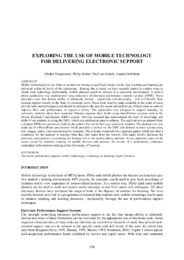| dc.contributor.author | Famakinwa, Oladeji | en |
| dc.contributor.author | Barker, Philip | en |
| dc.contributor.author | van Schaik, Paul | en |
| dc.contributor.author | Onibokun, Joseph | en |
| dc.coverage.spatial | CY - Λευκωσία | en |
| dc.creator | Famakinwa, Oladeji | en |
| dc.creator | Barker, Philip | en |
| dc.creator | van Schaik, Paul | en |
| dc.creator | Onibokun, Joseph | en |
| dc.date.accessioned | 2016-02-01T09:36:22Z | |
| dc.date.available | 2016-02-01T09:36:22Z | |
| dc.date.issued | 2007 | |
| dc.identifier.uri | http://hdl.handle.net/10797/14555 | en |
| dc.description | Περιέχει το πλήρες κείμενο | el |
| dc.description.abstract | Mobile technologies in one form or another are having a significant impact on the way teaching and learning are
delivered within all levels of the curriculum. Bearing this in mind, we have recently started to explore ways in
which such technology (particularly, mobile phones) could be utilised in a university environment. A mobile
phone application was implemented using principles of electronic performance support systems (EPSS). These
principles state that human ability is inherently limited - cognitively and physically - and will benefit from
external support usually in the form of electronic tools. These tools must be made available at the point of need,
provide task-oriented support and should be tailored to the specific needs and skill-levels of their users in order to
improve their task performance or cognitive ability. The application was designed to support learning, by
university students, about how academic libraries organise their books using classification systems such as the
Dewey Decimal Classification (DDC) system. Previous research has demonstrated the lack of knowledge and
skills of our students in using the DDC, which our application aims to address. The application was adapted from
a desktop EPSS tool previously built by the authors for use by first-year university students. The desktop tool was
made up of a PowerPoint presentation which provided a tutorial on the DDC and decimal number system using
text, images, audio, video and interactive elements. The tool also contained two computer games which provided a
simulation for the students to practice what they had learnt from the tutorial. This paper briefly discusses the
problems encountered in converting the desktop tool to the mobile phone platform. It also addresses some of the
issues raised by students learning on mobile devices and presents the results of a preliminary evaluation
undertaken with students studying at the University of Teesside. | en |
| dc.language.iso | eng | en |
| dc.publisher | University of Cyprus | en |
| dc.relation.ispartof | Information and communication technology | en |
| dc.rights | info:eu-repo/semantics/openAccess | en |
| dc.rights | Open Access | en |
| dc.source | CBLIS Conference Proceedings 2007 Contemporary Perspective on new technologies in science and education | en |
| dc.title | Exploring the use of mobile technology for delivering electronic support | en |
| dc.type | info:eu-repo/semantics/conferenceObject | en |
| dc.subject.uncontrolledterm | Electronic performance support | en |
| dc.subject.uncontrolledterm | Mobile technology | en |
| dc.subject.uncontrolledterm | e-learning | en |
| dc.subject.uncontrolledterm | m-learning | en |
| dc.subject.uncontrolledterm | Digital libraries | en |
| dc.contributor.conferenceorganizer | Learning in Science Group, University of Cyprus | en |
| dc.contributor.coordinator | Constantinou, Constantinos P. | en |
